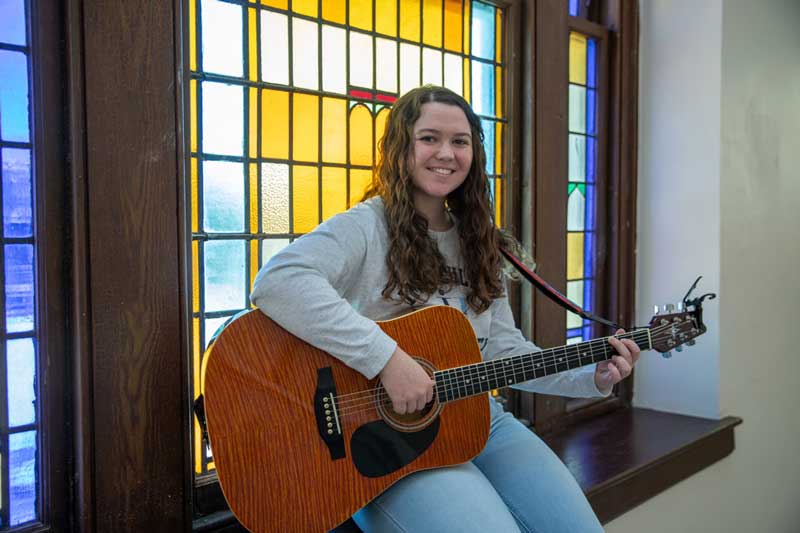Music Therapy, B.Mus.
Explore Music Therapy at Immaculata University
You know the feeling when your favorite song is playing – you turn up the volume and bask in the glory of the moment. Music is not only empowering but also therapeutic.
Music therapists use different kinds of musical experiences, such as singing, playing instruments, writing songs, and listening to and talking about music, to meet clients’ needs using the unique relationship between the client, the music and the therapist.
At A Glance
Program: Bachelor of Music
Audience: Undergraduate students
Format: Face-to-face classes
Next Start Date: August 26, 2024
Cost: Full-time tuition
Time to Completion Four years
"I learned a lot about myself by learning about music therapy. My classes emphasized connecting the music to yourself, before you are able to connect it with others. To create a strong foundation for practicing music therapy, we worked on ourselves and things we may struggle with when we work with future clients. Getting hands-on experience with how our music could affect clients helped me prepare to build strong clinical relationships in my practicum placements. I learned how to lead with confidence in life and in my sessions, as well as how to use specific skills I have in music to help others."
Meghan Hernandez '22
Music Therapist at Northbrook Behavioral Health Hospital
As a music therapy major, you will develop your skills and interests in small classes taught by attentive, supportive faculty.
- Build clinical music skills through individual lessons in piano, guitar and voice that are tailored to your learning needs and abilities.
- Learn music therapy methods through personal experience in the Music and Wellness course.
To gain professional experience, you will complete supervised fieldwork experiences in different clinical settings to observe, assist, and lead music therapy sessions. You will learn how music therapy applies to diverse clinical populations, including children with special needs, people with medical or psychiatric problems, and adults in hospice or palliative care. Faculty will support you during the internship placement process to match your interests with an appropriate site, population or location. Our students have recently interned at places such as:
- Easter Seals of Southeast Pennsylvania
- Reading Hospital
- Seasons Hospice
- Nemours Children’s Health System
- Royer-Greaves School for the Blind
- The Arc of Chester County
- Tempo! Music Therapy Services
- Paul’s Run Retirement Community
- Kennedy Krieger Institute
- Northbrook Behavioral Health Hospital
You can also participate in a range of co-curricular activities and enrichment programs, including the Music Therapy Club, regional and national conferences, and national and international guest presentations.
Immaculata also offers a master’s degree in music therapy if you want to continue your education. During your senior year, you can take nine graduate credits that will count toward both your undergraduate and graduate degree in music therapy, at no extra charge.
- Opportunity for direct entry into IU’s advanced music therapy professional and/or counseling track master’s degree
- Free continuing education program for students and alumni
Recent faculty-mentored research projects have explored questions such as:
- Does live versus recorded music have different physiological effects on listeners?
- Is instrumental pop or classical music more relaxing to college music majors?
- Does music played on a Steinway piano versus a digital piano have different effects on listeners’ heart rate variability?
- Does background music help or hurt students’ ability to focus and learn?
As a music therapy major at Immaculata, you’ll take music, music therapy and psychology courses in a liberal arts program. These courses develop your core musicianship, your clinical skills, and your understanding of the psychology of music and psychopathology. At the conclusion of the program, you are eligible to take the Board Certification exam (MT-BC), administered through CBMT, leading to a nationally acknowledged credential.
Music therapists work in a wide variety of clinical and educational settings: hospitals, psychiatric institutions, nursing homes, community mental health centers, prisons, schools, private practice, and hospice facilities. As the profession continues to grow, music therapists with clinical experience and advanced degrees are increasingly in demand, particularly in psychiatric settings and hospitals. Immaculata receives many requests for assistance in finding music therapists to fill positions, and these are shared with interns and graduates.
Our alumni have been hired at Children’s Hospital of Philadelphia, Artistic Elements Music Instruction & Therapy, Royer Greaves School for the Blind, Seasons Hospice, St. Luke’s University Health Network and Northbrook Behavioral Health Hospital.
“Immaculata’s music therapy program prepared me for not only the academic portion of the field but also the clinical fieldwork that is required. The music therapy program gave me ample opportunities to observe, participate in, and lead music therapy experiences. Immaculata provided me with an excellent education and practicums that allowed me to work with multiple populations to help decide which population I may want to work with.”
—Paige Gale ’18, MT-BC, music therapist at Seasons Hospice and Palliative Care
Students who are pursuing substance abuse treatment education or internships may be eligible for a $1,000 scholarship made available through the Steps to Recovery treatment facility in Levittown, PA.
Immaculata University is an accredited institutional member of the National Association of Schools of Music (NASM), and the music therapy program is approved by the American Music Therapy Association (AMTA) and the Certification Board for Music Therapists (CBMT).
Just The Facts
0:1
Student to Faculty RatioWith a 10:1 student/faculty ratio, personalized academic attention is a hallmark of Immaculata’s programs.
0+
Academic ProgramsImmaculata's 60+ undergraduate programs and 12+ graduate programs provide career-focused education for in-demand jobs.
0+
Clubs and OrganizationsChoose from more than 30 organizations to build relationships, broaden perspectives and gain leadership experience.
